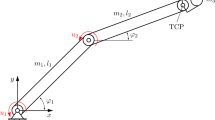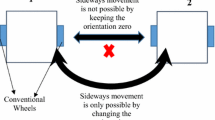Abstract
In this paper, an output-feedback adaptive scheme for the global position stabilization of robot manipulators with bounded inputs is proposed. Compared to the previous output-feedback adaptive approaches developed in a bounded-input context, the proposed free-of-velocity feedback controller guarantees the adaptive regulation objective: globally, avoiding discontinuities throughout the scheme, preventing the inputs to reach their natural saturation bounds, and imposing no saturation-avoidance restriction on the control gains. Moreover, the developed scheme is not restricted to the use of a specific saturation function to achieve the required boundedness, but may involve any one within a set of smooth and non-smooth (Lipschitz-continuous) bounded passive functions that include the hyperbolic tangent and the conventional saturation as particular cases. Experimental results corroborate the efficiency of the proposed scheme.
Similar content being viewed by others
References
M. Takegaki and S. Arimoto, “A new feedback method for dynamic control of manipulators,” Journal of Dynamic Systems, Measurement, and Control, vol. 102, no. 2, pp. 119–125, June 1981.
N. J. Krikelis and S. K. Barkas, “Design of tracking systems subject to actuator saturation and integrator wind-up,” International Journal of Control, vol. 39, no. 4, pp. 667–682, July 1984.
H. Berghuis and H. Nijmeijer, “A passivity approach to controller-observer design for robots,” IEEE Trans. on Robotics and Automation, vol. 9, no. 6, pp. 740–754, December 1993.
P. Tomei, “Adaptive PD controller for robot manipulator,” IEEE Trans. of Robotics and Automation, vol. 7, no. 4, pp. 565–570, August 1991.
R. Kelly, V. Santibáñez, and H. Berghuis, “Point-topoint robot control under actuator constraints,” Control Engineering Practice, vol. 5, no. 11, pp. 1555–1562, November 1997.
V. Santibáñez, R. Kelly, and F. Reyes, “A new setpoint controller with bounded torques for robot manipulators,” IEEE Trans. on Industrial Electronics, vol. 45, no. 1, pp. 126–133, February 1998.
A. Zavala-Río and V. Santibáñez, “Simple extensions of the PD-with-gravity-compensation control law for robot manipulators with bounded inputs,” IEEE Trans. on Control Systems Technology, vol. 14, no. 5, pp. 958–965, September 2006.
V. Santibáñez and R. Kelly, “On global regulation of robot manipulators: Saturated linear state feedback and saturated linear output feedback,” European Journal of Control, vol. 3, no. 2, pp. 104–113, April–June 1997.
A. Loría, R. Kelly, R. Ortega, and V. Santibáñez, “On global output feedback regulation of Euler-Lagrange systems with bounded inputs,” IEEE Trans. on Automatic Control, vol. 42, no. 8, pp. 1138–1143, March 1997.
I. V. Burkov, “Stabilization of mechanical systems via bounded control and without velocity measurements,” Proc. 2nd Russian-Swedish Control Conf., St. Petersburg, Russia, pp. 37–41, August 1995.
V. Santibáñez and R. Kelly, “Global regulation for robot manipulators under SP-SD feedback,” Proc. IEEE Int. Conference on Robotics and Automation, Minneapolis, MN, pp. 927–932, April 1996.
A. Zavala-Río and V. Santibáñez, “A natural saturating extension of the PD-with-desired-gravity-compensation control law for robot manipulators with bounded inputs,” IEEE Trans. on Robotics, vol. 23, no. 2, pp. 386–391, April 2007.
R. Ortega, A. Loría, R. Kelly, and L. Praly, “On passivity-based output feedback global stabilization of Euler-Lagrange systems,” Proc. of the 33rd IEEE Conference on Decision and Control, Lake Buena Vista, FL, pp. 381–386, December 1994.
R. Colbaugh, E. Barany, and K. Glass, “Global regulation of uncertain manipulators using bounded controls,” Proc. IEEE Int. Conf. on Rob. and Aut., Albuquerque, NM, pp. 1148–1155, April 1997.
E. Zergeroglu, W. Dixon, A. Behal, and D. Dawson, “Adaptive set-point control of robotic manipulators with amplitude-limited control inputs,” Robotica, vol. 18, no. 2, pp. 171–181, March 2000.
A. Laib, “Adaptive output regulation of robot manipulators under actuator constraints,” IEEE Trans. on Robotics and Automation, vol. 16, no. 1, pp. 29–35, February 2000.
S. Liuzzo and P. Tomei, “Global adaptive learning control of robotic manipulators by output error feedback,” International Journal of Adaptive Control and Signal Processing, vol. 23, no. 1, pp. 97–109, January 2009.
C. Hu, B. Yao, Z. Chen, and Q. Wang, “Adaptive robust repetitive control of an industrial biaxial precision gantry for contouring tasks,” IEEE Trans. on Control Systems Technology, vol. 19, no. 6, pp. 1559–1568, November 2011.
B. S. Park, J. Y. Lee, J. B. Park, and Y. H. Choi, “Adaptive control for input-constrained linear systems,” International Journal of Control, Automation, and Systems, vol. 10, no. 5, pp. 890–896, October 2012.
E. Aguiñga-Ruiz, A. Zavala-Río, V. Santibáñez, and F. Reyes, “Global trajectory tracking through static feedback for robot manipulators with bounded inputs,” IEEE Trans. on Control Systems Technology, vol. 17, no. 4, pp. 934–944, July 2009.
A. Zavala-Río, E. Aguiñaga-Ruiz, and V. Santibáñez, “Global trajectory tracking through out-put feedback for robot manipulators with bounded inputs,” Asian Journal of Control, vol. 13, no. 3, pp. 430–438, May 2011.
H. K. Khalil, Nonlinear Systems, 2nd edition, Prentice-Hall, Upper Saddle River, NJ, 1996.
N. Rouche, P. Habets, and M. Laloy, Stability Theory by Lyapunov’s Direct Method, Springer-Verlag, New York, 1977.
L. Sciavicco and B. Siciliano, Modelling and Control of Robot Manipulators, 2nd edition, Springer, London, 2000.
R. Kelly, V. Santibáñez, and A. Loría, Control of Robot Manipulators in Joint Space, Springer, London, 2005.
M. Gautier and W. Khalil, “On the identification of the inertial parameters of robots,” Proc. of the 27th Conference on Decision and Control, Austin, TX, pp. 2264–2269, December 1988.
D. J. López-Araujo, A. Zavala-Río, V. Santibáñez, and F. Reyes, “Global adaptive regulation of robot manipulators with bounded inputs,” Proc. of the 10th International IFAC Symposium on Robot Control, Dubrovnik, Croatia, pp. 806–813, September 2012.
A. N. Michel, L. Hou, and D. Liu, Stability of Dynamical Systems, Birkhäuser, Boston, 2008.
F. Reyes and R. Kelly, “Experimental evaluation of model-based controllers on a direct-drive robot arm,” Mechatronics, vol. 11, no. 3, pp. 267–282, April 2001.
Author information
Authors and Affiliations
Corresponding author
Additional information
Recommended by Editorial Board member Youngjin Choi under the direction of Editor Hyungbo Shim.
The first and third authors were supported by CONACYT, Mexico (3rd author: Project No. 134534). One of the authors, V. Santibáñez, thanks José A. Yarza for his invaluable help during the experimental essays.
Daniela J. López-Araujo received her B.S. degree in Electronic Engineering from the Instituto Tecnologico de San Luis, Mexico; and her M.S. degree in Control and Dynamical Systems from the Instituto Potosino de Investigacion Cientifica y Tecnologica, Mexico, in 2005 and 2008 respectively. Her reaserch interests are modelling and control of nonlinear systems.
Arturo Zavala-Río received his B.S. degree in Electronic Systems Engineering and an M.S. degree in Control Engineering from the Instituto Tecnologico y de Estudios Superiores de Monterrey, Mexico, in 1989 and 1992 respectively, and his D.E.A. and Ph.D. degrees in Automatic Control from the Institut National Politechnique de Grenoble, France, in 1994 and 1997 respectively. He held professor-researcher positions at Universidad Autonoma de Queretaro (1999–2000), Mexico, and Universidad Autonoma de San Luis Potosi (2000–2001), Mexico. He has been visiting researcher at Mechanical Engineering Laboratory (1998), Japan, and Universite de Technologie de Compiegne (2001–2002), France. Since 2002, he is a full-time researcher at the Instituto Potosino de Investigacion Cientifica y Tecnologica, Mexico. His research topics focus on the modelling, analysis, and control of nonlinear systems, with particular interest in robot manipulators.
Víctor Santibáñez received his B.S. and M.Sc. degrees in Electronics Engineering from Instituto Tecnológico de la Laguna, Torreon, Mexico, in 1977 and 1984, respectively, and his Ph.D. degree from Centro de Investigación Científica y de Educación Superior de Ensenada Research Center, Ensenada, Mexico, in 1997. From 1977 to 1981, he was with the respective Industrial Electronics Departments of the iron and steel industry at Altos Hornos de Mexico and at Metalurgica Mexicana Peñoles. From 1989 to 1990, he was with the Instituto de Automatica Industrial, Consejo Superior de Investigaciones Científicas, Madrid, Spain. He is currently a Research Professor at the Instituto Tecnológico de la Laguna. His research interests are robot control, nonlinear systems control, and fuzzy control.
Fernando Reyes was born in Puebla, Mexico in March 7, 1962, and received his B.S. and M.Sc degrees in Electronics Engineering in 1984 and 1989 from Benemerita Universidad Autonoma de Puebla and INAOE, respectively. He received a Ph.D. in electronics at CICESE Center Research, Mexico in 1997. Since 1980, Dr. Reyes has been working at Benemerita Universidad Autonoma de Puebla. His research interests are in the fields on control of robot manipulators with special emphasis on practical applications. Dr. Reyes has published two books and many scientific papers in national and international conferences and journals.
Rights and permissions
About this article
Cite this article
López-Araujo, D.J., Zavala-Río, A., Santibáñez, V. et al. Output-feedback adaptive control for the global regulation of robot manipulators with bounded inputs. Int. J. Control Autom. Syst. 11, 105–115 (2013). https://doi.org/10.1007/s12555-012-9203-4
Received:
Revised:
Accepted:
Published:
Issue Date:
DOI: https://doi.org/10.1007/s12555-012-9203-4




